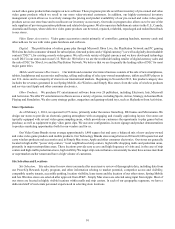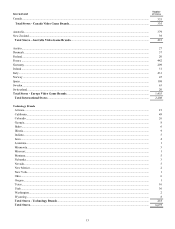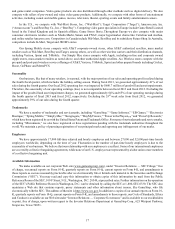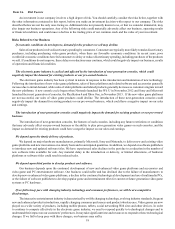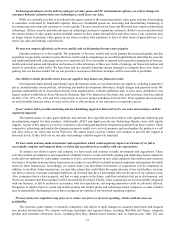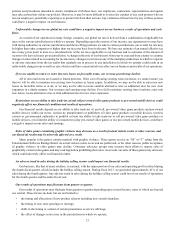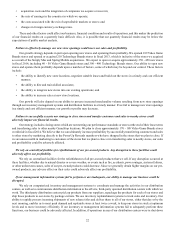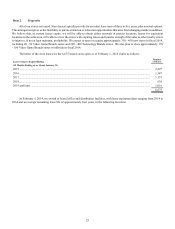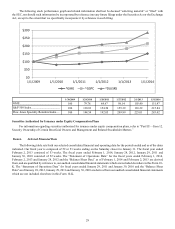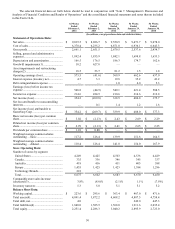GameStop 2013 Annual Report Download - page 37
Download and view the complete annual report
Please find page 37 of the 2013 GameStop annual report below. You can navigate through the pages in the report by either clicking on the pages listed below, or by using the keyword search tool below to find specific information within the annual report.20
international video game and PC software specialty stores located in malls and other locations, such as Carrefour and Media Markt;
toy retail chains; direct sales by software publishers; and online retailers and game rental companies. Some of our competitors
have longer operating histories and may have greater financial resources than we do or other advantages, including non-taxability
of sold merchandise. In addition, video game products and content are increasingly being digitally distributed and new competitors
built to take advantage of these new capabilities are entering the marketplace, and other methods may emerge in the future. We
also compete with other sellers of pre-owned video game products and other PC software distribution companies, including Steam.
Certain of our mass-merchants competitors are expanding in the market for pre-owned video games through aggressive pricing
which may negatively affect our margins, sales and earnings for these products. Additionally, we compete with other forms of
entertainment activities, including browser, social and mobile games, movies, television, theater, sporting events and family
entertainment centers. Our Technology Brands stores compete with a wide variety of other wireless carriers and retailers and
consumer electronics retailers. If we lose customers to our competitors, or if we reduce our prices or increase our spending to
maintain our customers, we may be less profitable.
We depend upon our key personnel and they would be difficult to replace.
Our success depends upon our ability to attract, motivate and retain a highly trained and engaged workforce, including key
management for our stores and skilled merchandising, marketing, financial and administrative personnel. The turnover rate in the
retail industry is relatively high, and there is an ongoing need to recruit and train new store employees. Factors that affect our
ability to maintain sufficient numbers of qualified employees include employee morale, our reputation, unemployment rates,
competition from other employers and our ability to offer appropriate compensation packages. Additionally, we depend upon the
continued services of our key executive officers: Daniel A. DeMatteo, our Executive Chairman; J. Paul Raines, our Chief Executive
Officer; Tony D. Bartel, our President; Robert A. Lloyd, our Executive Vice President and Chief Financial Officer; Michael Mauler,
our Executive Vice President-International; and Michael P. Hogan, our Executive Vice President-Strategic Business and Brand
Development. Our inability to recruit a sufficient number of qualified individuals or our failure to retain key employees in the
future may have a negative impact on our business.
International events could delay or prevent the delivery of products to our suppliers.
Our suppliers rely on foreign sources, primarily in Asia, to manufacture a portion of the products we purchase from them.
As a result, any event causing a disruption of imports, including natural disasters or the imposition of import restrictions or trade
restrictions in the form of tariffs or quotas, could increase the cost and reduce the supply of products available to us, which could
lower our sales and profitability.
Our international operations expose us to numerous risks.
We have international retail operations in Australia, Canada and Europe. Because release schedules for hardware and software
introduction in these markets often differ from release schedules in the United States, the timing of increases and decreases in
foreign sales may differ from the timing of increases and decreases in domestic sales. We are also subject to a number of other
factors that may affect our current or future international operations. These include:
• economic downturns, specifically in the regions in which we operate;
• currency exchange rate fluctuations;
• international incidents;
• natural disasters;
• government instability; and
• competitors entering our current and potential markets.
Our operations in Europe are also subject to risks associated with the current economic conditions and uncertainties in the
European Union (“EU”). European and global economic conditions have already been negatively impacted by the ability of certain
EU member states to service their sovereign debt obligations. Additionally, there continues to be uncertainty over the possibility
that other EU member states may experience similar financial troubles, the ultimate outcome of the EU governments’ financial
support programs, the possible breakup or restructuring of the EU and the possible elimination or restructuring of the EU monetary
system. These continued uncertainties could further disrupt European and global economic conditions. Unfavorable economic
conditions could negatively impact consumer demand for our products. These factors could have an adverse effect on our business,
results of operations and financial condition.
We are also subject to risks that our operations outside the United States could be conducted by our employees, contractors,
representatives or agents in ways that violate the Foreign Corrupt Practices Act or other similar anti-bribery laws. While we have


